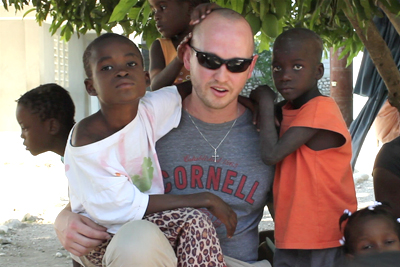Orphans benefit from Barrett Keene's walk across America
By Joyanna Hansen

Barrett Keene, Ph.D. '13, walked into San Francisco Nov. 17 after a 3,475-mile, nearly 10-month trek across the U.S. for the "Go Walk America" project, designed "to raise awareness about the harsh realities faced by 145 million orphans worldwide and present opportunities for people to give," according to his website.
Keene partnered with a Kansas City nonprofit, the Global Orphan Project (GO Project), to raise funds across the country for 2,300 school uniforms that will be distributed to orphans in Uganda and Haiti. On his journey, Keene spoke to 48,000 people at churches and schools and communicated with more than 900,000 people through such social media as television and radio, spreading awareness about global orphan needs.
The GO Project provides locally sewn school uniforms (sponsored by donors at $20 each) to orphans in communities where children are not allowed to attend school without a uniform. This allows the neediest children to get an education, while also raising money for global orphan care.
"When you give one [uniform], three things actually happen: educational equality, job creation and orphan care," said Keene, who is earning a doctorate in the area of learning, teaching and social policy.
Producing a school uniform at a living wage takes about $10, according to Keene. "Uniforms will be produced in the same communities where the uniforms will be given out to orphans," he added, providing work to local residents in impoverished communities.
The other half of each donation raised "as much as $23,000 to provide food, shelter and care for orphans in 15 countries around the world," said Keene.
To make the "Go Walk America" project possible, there were "literally thousands of people helping out," said Keene.
A Cornell undergraduate team in the Dyson School of Applied Economics and Management's Business Opportunities in Leadership and Diversity program helped organize Keene's trip, and students from Cornell and three other universities led social media communication efforts.
"I committed to do this project without having any idea how it was going to happen, logistically or financially," said Keene.
Keene began the trip Jan. 28 in Miami, walking solo without a support vehicle after two friends planning to walk with him dropped out due to health problems. Twenty days into his trek, someone donated a support van, and friends stepped in for much of the journey to walk with Keene and drive the van. The social fitness company didfit.com sponsored all of Keene's expenses for the walk, including food and fuel for the support van, allowing all donations to go to the GO Project.
Keene interviewed teachers selected for leadership excellence during the trip, "asking, observing and listening to students and teachers in a diverse array of classrooms in several parts of our country," he wrote on his blog.
Michael Sugihara '13, a policy analysis and management major, walked with Keene for seven weeks during the summer.
Sugihara recalled meeting a child on the road who "handed me a Tupperware completely full of change [money she had raised from a lemonade stand] to helps kids in Haiti. One of the most beautiful things that we witnessed was seeing kids serving kids and true joy in helping others.
"We urged those whom we met to seek some way in which they could serve others, whether it is walking across the country to help orphans in Haiti or walking across the street to help their neighbor," said Sugihara.
Graduate student Joyanna Hansen is a writer intern for the Cornell Chronicle.
Media Contact
Get Cornell news delivered right to your inbox.
Subscribe